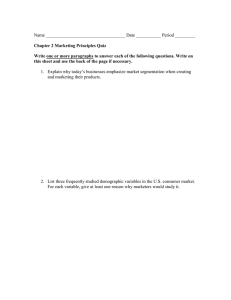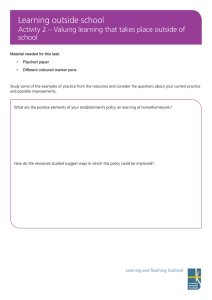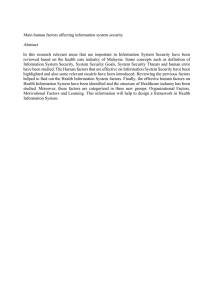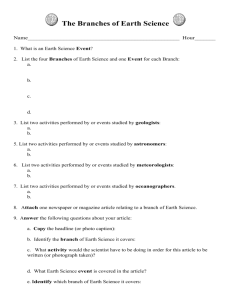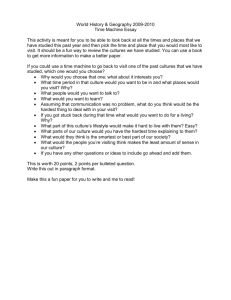Test Taking: Barriers to Test Performance
advertisement
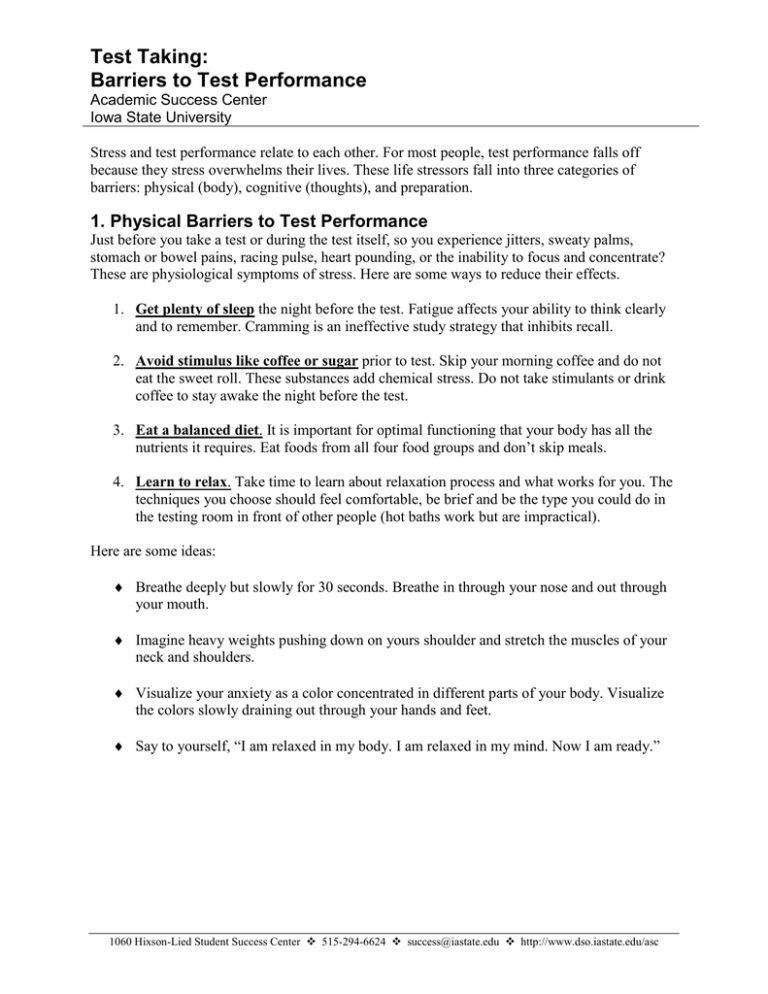
Test Taking: Barriers to Test Performance Academic Success Center Iowa State University Stress and test performance relate to each other. For most people, test performance falls off because they stress overwhelms their lives. These life stressors fall into three categories of barriers: physical (body), cognitive (thoughts), and preparation. 1. Physical Barriers to Test Performance Just before you take a test or during the test itself, so you experience jitters, sweaty palms, stomach or bowel pains, racing pulse, heart pounding, or the inability to focus and concentrate? These are physiological symptoms of stress. Here are some ways to reduce their effects. 1. Get plenty of sleep the night before the test. Fatigue affects your ability to think clearly and to remember. Cramming is an ineffective study strategy that inhibits recall. 2. Avoid stimulus like coffee or sugar prior to test. Skip your morning coffee and do not eat the sweet roll. These substances add chemical stress. Do not take stimulants or drink coffee to stay awake the night before the test. 3. Eat a balanced diet. It is important for optimal functioning that your body has all the nutrients it requires. Eat foods from all four food groups and don’t skip meals. 4. Learn to relax. Take time to learn about relaxation process and what works for you. The techniques you choose should feel comfortable, be brief and be the type you could do in the testing room in front of other people (hot baths work but are impractical). Here are some ideas: Breathe deeply but slowly for 30 seconds. Breathe in through your nose and out through your mouth. Imagine heavy weights pushing down on yours shoulder and stretch the muscles of your neck and shoulders. Visualize your anxiety as a color concentrated in different parts of your body. Visualize the colors slowly draining out through your hands and feet. Say to yourself, “I am relaxed in my body. I am relaxed in my mind. Now I am ready.” 1060 Hixson-Lied Student Success Center 515-294-6624 success@iastate.edu http://www.dso.iastate.edu/asc 2. Cognitive Barriers to Test Performance Before you take a test or during the test itself, do you spend a lot of time worrying about your performance? Do you expect to do poorly on the test no matter how much time you spend in preparation? Do you talk to yourself and tell yourself how badly you are doing? These selfstatements or “self-talk” are barrier to your test performance. Here are some examples of cognitive errors: 1. Overgeneralizations: “I can never get math,” or “I always do poorly on essay tests.” 2. Catastrophizing: “Taking a test in a horrible experience,” or “If I do poorly on this test, I’ll ruin my whole life.” 3. Using an Inappropriate Example: “My uncle Larry flunked this course when he was in college,” or “This guy in my Spanish class told me that Professor Johnson gives horrible tests.” 4. Improper Inference: “I just have to accept that I will never do well on tests.” 5. Conflicting Goals: “I want to do well on this test, but I just have to make the party on the night before.” 6. Personalization: “If I flunk this test, I’ll consider myself a total failure.” 7. Using a Single Standard: “I have to get at least a ‘B’ on this test or it won’t mean a thing.” Many other examples are possible. “Self-talk” is as individual as the people who take tests. Listen to what you say to others and then listen to what you say to yourself. Learn to ask yourself the questions. “What am I telling myself that is making it harder for me to perform well on this test?” Begin constructing positive self-statements to replace counter-productive, negative self-talk. Use affirming statements while you study and when taking tests. Remind yourself of past successes and how well you have prepared, which will help you recall your knowledge of the material. Visualize yourself doing well on the exam; most importantly, visualize yourself doing YOUR BEST! Remember, an exam grade represents only your performance on the particular test, not your overall knowledge. 3. Preparation Barriers to Test Performance Maybe you are not experiencing the kind of symptoms mentioned in the first two sections. No matter how physiologically calm you are, no matter how cognitively clear and confident you are, you aren’t very likely to do well on a test for which you didn’t spend the time to prepare. Remember this old saying: “Aim at nothing and you will hit the target every time.” Test preparation is aiming to do well. One key strategy to help you improve your aim is to stimulate actual testing conditions while you study. For example, if you will be doing 10 math problems in 50 minutes, do that as a dress rehearsal—time yourself, work without reference to your notes or text. Learn how to work smart and fast before the actual exam. Your rehearsal will help you target areas that you need to focus on and will confirm what you know. There are more handouts describing other test-taking techniques in the Academic Success Center—ask for them and use them! Test Taking: Our “Sad But True” Testing Stories Academic Success Center Iowa State University 9. I thought a test was going to be really easy so I didn’t study. Failed…badly. 10. Studied for hours and days with the material I didn’t understand and FINALLY understood it, but failed the other 70% of the exam that covered the stuff I “knew.” 11. I had to get B’s on all my finals so I studied for days on all of my classes. I got B’s on all but one math. This one I studied for days on and still failed. 12. I didn’t think I needed to study so I didn’t study at all. 13. I studied for 3 hours a day for a week before the test and still failed. 14. The CyRide made more stops than I anticipated and I was almost late for my 9am exam. 15. I studied really hard for my physics test, went in and got help. I hought I understood the material…took the test, it was all wrong. Preparation Cognitive Sad but True Story 1. My alarm got set back 1 hour (I hit the day-light savings button) and I walked into class an hour late, while they were taking a quiz. Thankfully it was a 2 hour class and only a practice quiz! 2. I studied so hard, read the full chapters of the test, knew all the material that she said would be on the exam. Half of the questions did not relate to what she asked me to study. 3. I had a math midterm. I studied for hours and grasped what I needed to know. During the exam, I freaked out and forgot all of it. 4. One of my friends got so nervous that he got sick right as the test started and had to take it later in a room by himself. 5. I read the first 3 chapters of my econ book the first week of class so I would be ahead of everyone else, but the bookstore gave me the wrong econ book. 6. I studied an hour (or more) a night. I use flashcards, did the homework, sit in the front row, go to the office hours, take notes, and highlight and mark in the book. Still got a D on the big test. 7. I really thought I understood the material on a test and felt very confident while taking it only to find out I got 12 out of 25. 8. I had a quiz in Religion and brought the wrong notebook to study from. Physical This is a set of our “Sad but True” stories. Read each story, and decide whether the cause of the issue was a physical, cognitive, or preparation barrier. (Some stories may include multiple types of barriers.) 16. I locked myself in my room from 7-11 for a whole week to study for an exam and I got a “Super F” (34 out 70). 17. I worked hard on note taking and studying for weeks in m my biology class. The first test came and I got a 60%. Although it didn’t make my overall grade that bad, I was disappointed. 18. I studied all night over a chapter of Spanish and got to class and it was on something completely different. 19. I studied and received help for a midterm, but still got only a 30%. 20. Studied all night, but it was the wrong section for the quiz. 21. When I was taking one of my exams I wasn’t paying close attention when my instructor was giving directions. So I had to redo the whole test again and took 2 hours. 22. I have never done, achieved, or completed anything remotely impressive. What common mistakes did you observe, and what strategies can be used to overcome these mistakes? Mistake Strategies
